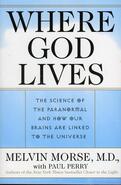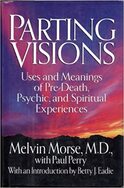 The most strident skeptics are often that way because they have had a personal world-shattering spiritual experience. Sometimes these experiences are so profound that they make them question everything they previously believed. So of course, they are going to ask hard questions. Since these questions are often based in fear of the unknown, they come across as angry and hostile. This is especially true when they have suffered the loss of a child. They can see my research as fairy tales designed to simply make them feel better but ultimately not true or real. The stakes are high for them. If my research is true, then a profound spiritual experience that they had previously dismissed might also be true. And all their previous assumptions about life and death might be false. One such skeptic was a Critical Care Nurse I had worked closely with for many years. After I published our research teams findings on near death experiences in the medical literature, I was invited to present my findings at Grand Rounds at Seattle Children’s Hospital. Afterwards, the doctors and other professors gathered around, fascinated by our research, and recounting their own experiences with patients. A frequent comment was that they had too heard spiritual visions from patients but previously had felt uncomfortable discussing them. Now there was a scientific framework to discuss them with patients. In other words, suddenly it was okay to talk about something that previously had been dismissed or trivialized. Except for this nurse. Her thin body quivered, and her face was pinched and angry as she pushed her way through the audience towards me. She stridently attacked me, in front of my colleagues, saying that my research was not scientific, that it meant nothing. I was taken aback, felt defensive, and didn’t know what to say. I stammered and started to repeat that the most prestigious medical journals had accepted our research as well as the Heads of the Departments of Psychiatry, Neurology and the Intensive Care Unit at Seattle Children’s. She just scoffed and turned her back on me. Listening to Anger From time to time, I would see her in the hallways. I knew her well, as she worked in the Intensive Care Unit. At first, I was defensive, even ducking into a patient’s room to avoid speaking to her. Yet as I listened beyond her anger, I came to realize that she was asking me important questions, the same questions we attempted to answer with our research. One day I was in the main lobby talking with some of the residents. nurses and medical students. I saw her bearing down on me, an intensity in her eyes, that made me think of a mother about to collar a badly behaved son. She was pushing people out of the way, without so much as an “excuse me”. I could feel my heart rate climbing and my palms were beginning to perspire. I knew that I had some explaining to do, but just didn’t know about what. “I have read all your papers in the medical journals” she said. “how do you know that these kids weren’t just having a reaction to morphine or valium. What about all the other drugs we give patients in the ICU”. I calmly explained that we studied patients who were given all the same drugs as those children who had had near death experiences, many times at much higher doses. But they weren’t near death. None of them had anything resembling a near death experience. “Okay, but how do you know they weren’t just making it all up? Maybe they just wanted to be on a talk show with the famous Dr. Morse. I have heard my patients tell all sorts of crazy stories about monsters chasing them with needles.” I remembered how Elizabeth Kubler Ross had counseled me to listen to angry people. “Often they push people away with their anger but remember that under that anger often is great hurt”. I looked at the nurse closely and saw the hurt in her eyes. Even tears. Skeptics are Often Struggling with Powerful Emotions I took her to a bench and spoke calmly and lovingly to her. “We studied these patients long before I was the Dr. Morse on the Oprah Show. They tell amazingly consistent experiences which have little in common with Intensive Care Unit psychosis. I had the same questions you have. You know Don Tyler (Head of the Intensive Care Unit) and Jerry Milstein (Head of the Department of Neurology). They would never have put their name to our findings unless they were rock solid science.” But tell me, why is this so important to you? Tears came to her eyes as she told me her story. When her daughter was 14, she came down with leukemia. The two vowed to fight this illness with all the heart they could muster, but their best was not enough. During the next two years, she spend 20 weeks in the hospital. This was during a time her friends were worrying about dressing for the prom or what jeans to wear that day for school. “My daughter was wearing a wig and throwing up all day” said the nurse. After her third relapse, our oncologist took the mother aside and told her that her daughter had only a few weeks to live. “I wanted to spend as much quality time with her as possible. I knew in my heart it was hopeless, but I wanted her to have a peaceful death, that was the only gift I could give her” said the nurse. Unfortunately, that was not to be. As her daughter deteriorated, the team of doctors with life support equipment was called. The mother, as an Intensive Care Unit Nurse, knew their efforts would be futile, but didn’t know how to tell the doctors to just let her little girl die. For several hours the doctors and nurses put lines into her veins and tubes into her nose. When her heart stopped, they put paddles on her chest and shocked her back to life. When the mother gasped at what was happening, a nurse led her from the room. “Finally, when it was all over, they let me come back into the room. The entire resuscitation team left with their heads down, none could look me in the eye. They felt they had failed me as they had not been able to keep my daughter alive.”. As a Critical Care Physician, I knew how they felt. It is a horrible feeling, wanting to do everything possible, and yet knowing that even if we succeed, it is only temporary, that the battle had been lost long ago. My Daughter Came Back to Give Me a Message The mother sat alone with her daughter and sobbed. She sat in silence. And then something shocking happened.
Her daughter sat up and looked her mother in the eye. “She was alive. I know she was”, she said. “She squeezed my hand and said “Stop crying Mom. I’m okay now. I watched everything that happened and saw them take you out of the room. I’m okay Mom. I love you.” “I am sorry I came on so strong with you Dr. Morse, but I had to be sure your research was solid. For the past 10 months, I thought what happened to me was all a grief induced hallucination. I didn’t believe what my heart knew was true. But after you presented your research at Grand Rounds, suddenly I knew I wasn’t out of my mind with grief. I know what I saw as a nurse. After your lecture, I realized that my daughter came back for me for just a few seconds to give me that message. After hearing about near death experiences, and that science that supports them as real, I will never think about my daughter’s death the same way again.
1 Comment
MY HUSBAND SAW THE EXACT SAME THING Often after death visitations come with their own validation. But we must be open to the idea of spiritual visions and more importantly, willing to talk about them and share with others. The case of hospice worker Lizabeth Sumner illustrates this point. Lizabeth was a veteran hospice nurse at San Diego Hospice. This down to earth veteran of hospice care had a visitation from one of her young patients, which cannot be dismissed as a “grief induced hallucination” or wish fulfillment. In this case, the fact that another person many miles away shared the same experience makes it even harder to dismiss. This supernatural story begins in the most natural of ways. Around Valentine’s Day, Lizabeth was busy helping a young boy die. He had a form of heart disease that doctors had already done all they could to prolong his life. Now that the end was near, Jimmy (not his real name) had decided to die at home. His parents supported his decision to die at home. They had seen him struggle for a long time, and now they just wanted to make him comfortable and surround him with love. Lizabeth came to help. She had taken a special liking to Jimmy and his family. They were tight-knit and caring, and Jimmy showed the confidence and intelligence of a child who was raised by loving supportive parents. Jimmy and his family gave everything they had to each other in those final days. They celebrated his birthday early as they knew he wouldn’t make it to the actual date. His only birthday wish was to go to dinner in a limousine. Jimmy’s parents couldn’t afford to hire one, so they borrowed a Ford Taurus from a friend and rode around town while Jimmy basked in the front seat as if he were a celebrity. When they stopped for dinner, it was for hot dogs and Slurpees. For a while, Jimmy forgot that this was his last birthday party. The actual death a few weeks later was not a surprise. His mother said that he got up early that day and made sandwiches for his brother’s school lunches. He told her: “I made them special today as they will need all the energy they can get”. Jimmy weakened as the day progressed. Lizabeth was there, and she saw the fight fading from his eyes. He asked that his favorite music be put on a tape player. The parents embraced Jimmy. “Come on,” they said. “Come on now, it’s all right Jimmy. It’s okay to let go”. For a moment he would seem to leave his body, then pull back in, but finally he sighed and left his body for good, surrounded by his brothers, parents, pediatrician, and Lizabeth. Lizabeth’s job was over now. She helped the family make some of the necessary arrangements and waited for the mortuary van to come. She noticed one of Jimmy’s brothers was standing in the front yard. She picked up a basketball and shot hoops with him for a bit. Then she went home. That was when it happened. As she drove down the freeway, the windshield was filled with a vision so vivid that she had to pull off to the side of the road. In this vision, she saw Jimmy, happy, and animated, holding a man’s hand. She couldn’t see the man, but saw that Jimmy was happy. He looked adoringly at the man’s face and had a look of great peace. The vision was as real as any ordinary experience. No words were spoken, but his eyes said it all. “The light was back in his eyes”, Lizabeth said. “I could hear him say, ‘I’m all right now’ although he did not move his lips”. Lizabeth only told her husband about the vision. She thought of keeping it that way, but at Jimmy’s funeral, thought she should at least tell his family. She pulled his mother aside and told her what she had seen. The woman immediately burst into tears. “That’s exactly what my husband saw” she said. “Right after Jimmy died, my husband saw the same thing”. This story captures the power of death related visions and after death visitations. They are paranormal yet very normal events that possess enormous potential for healing. We must begin to take these visions seriously. Studies show that as many as 70% of grieving parents, and 50% of grieving spouses have such experiences yet they are often ignored or trivialized. And we must have the courage to talk about them. If Lizabeth had not had the courage to tell Jimmy’s mother her vision of Jimmy, the family would not have been able to have the validation that both visions, seen miles apart, brought to this story. The spiritual experiences and intuitions surrounding the passing of loved ones can be powerful tools to begin the process of healthy grieving. But what if we don’t believe in a God? Or if we do believe and yet nothing is coming through? And what if our pain is so great we simultaneously desperately long for something, some sign, some message from our loved ones who have passed, and yet push away any thought that such a sign or message could be real? I am a former Pediatric Critical Care Physician and have researched dozens of children's near death experiences. As a result, I have worked with hundreds of grieving parents over the years. Often they are the most skeptical and cynical questioners of my research, for as one father bitterly told me: “What you seem to be selling is just too good to be true.” I welcomed his cynicism, as I understand that the stakes are high: If near death experiences are real, then the entire range of deathbed experiences are real, from premonitions of death to after death communications. Grieving parents deserve clear honest answers. After I thoroughly addressed his doubts, he shared with me that after his son passed, the family’s Christmas cactus shifted its blooming cycle from late November to the anniversary of his passing in late Spring. “I just thought it was a coincidence” he confided. “Now I know better”. A Miracle Might be a Parking Spot One young patient of mine's dying wish to her family was to see the Broadway production of the Lion King that was coming to their city. She watched the movie over and over and over again. “Please, please, can I see the real live Lion King”? Her parents bought tickets, barely able to afford them in a family already devastated by the financial ravages of their daughter’s chronic illness. Her leukemia relapsed again a week before they were to see the show. She peacefully passed in her sleep only days before the date of their tickets. They were in anguish as what to do about going to the show. It was their daughter’s dying wish, yet by the same token it represented the death of their child, an unbearable horror. Finally, with only minutes to spare before the show started, they jumped into the family car and drove furiously downtown to the theatre. Traffic was a nightmare, the show was sold out, and there were no parking spots to be found. Her father pounded angrily on the steering, shouting his frustration. And then, a parking spot, directly in front of the theatre opened up. Coincidence? Here is what her father told me: “we don’t believe in all that spiritual mumbo jumbo. At your talk to our parent support group, you told about a boy (who had passed) appearing at the foot of his parent’s bed and saying “I’m OK now, please stop crying”. Well, if that happened to us, we wouldn’t believe it. But when that parking spot opened up, we knew it was our daughter, and she was there with us when we watched the show. Our bereavement is made a little easier as that parking spot meant, for us, our daughter was watching us from the afterlife. Or a Postcard from the Dentist At a workshop on bereavement, a woman told me about a “coincidence” in her life that she felt was a message from her husband who had passed. Several days after her husband’s death, she received a postcard from her dentist reminding her of her routine checkup. When she examined the card, she gasped, as the picture on the postcard was of a beach on the Washington State coast that had a special meaning for her and her husband. This is where he proposed to her. They returned to this specific spot again and again throughout their marriage. She went to her appointment and asked about the postcard. She was told that the dentist simply bought a big batch of postcard depicting hundreds of scenes from around Washington State. It was just a coincidence that she received that particular card. Or proof of patterns of reality that are beneath the surface of our ordinary lives but emerge from time to time to reassure us that we are part of a greater plan. So much of loss involves the devastation of the meaning of our lives, we don’t have a child or a spouse or a parent or a loved one anymore. Finding out that loss is part of a greater pattern can restore meaning to our lives, even if it doesn’t make the loss any less painful. Or Someone Else's Dream I was lecturing at a hospice in Vancouver, Canada. The woman who picked me up at the airport wanted to tell me about a dream she had the night before. She said “it had all the features of the lucid dreams you say are so important in recognizing a visionary dream from just a regular dream. But I have no idea what it means.” She told me she had a vividly real dream, as if she was awake, of a young boy playing with a golden retriever. She couldn’t stop watching them, as they wrestled and the boy laughed and rolled around and around with his dog. Suddenly he stopped and looked at her. He said “Hi I’m Matt. Tell my Mom to stop crying. I am ok”. I gave my lecture and then met with a group of grieving parents that night. We talked about how hard it is to have anything but fury, anger and anguish after the loss of a child. One Mom bitterly told me “how can I have a dream about my son when I can’t even sleep”. I told her about the dream I had heard from the woman who picked me up at the airport. The Mother turned white. “oh my god. That’s my son.” No healing can occur until we embrace our pain. We cannot do this alone. We need someone else to sit on the edge of the abyss with us. Once I felt my heart was so damaged that I could never heal. I was broken. I was caring for my Mom who was slowly dying of dementia at the time. I clutched her close to me and cried to her “Mom, I am broken. I can never heal”. She cried out to the ceiling: “Lord, my son is broken. Well I am broken too. Heal us Lord”. I didn’t feel healed that day. I felt heard. Another person knew of my pain. And that was the start of healing. As I felt listened to, I was able in turn to listen, to others, and to the Universe around me. One day I was riding my bicycle to see my Mom. I was peddling up a steep hill. A young man rushed out of his house and called out to me: “Hey Dude, keep on keeping on. You can make it”. And then he went back inside his house! “What?” I thought. “Did that really happen?”. Then I realized that had I still been consumed with my grief, I would never have heard his words. My Mom’s prayer opened a crack in my heart, to allow the light to come in. But It's Not Happening for Me: Specific Exercises That May Help First: see where you are in the process of grieving. The stages are denial, anger, bargaining, depression, and acceptance. I asked Elizabeth Kubler Ross about these stages and she told me that they do not always progress in a linear fashion one after the other. The stages often circle around again and again. Recognize that if we are in the anger and denial phases, we probably are not going to be open to any sort of spiritual intuitions or understandings. In those situations, often the messages come to us indirectly through our friends and family. Next: Find a ritual that has meaning for both you and the person for whom you are grieving. For one mother, it was to bake cookies at 3:30 every afternoon, as that is when her son came home from school and they would talk. For a father, a conservative Republican, it was reading Wiccan prayers every Sunday morning as that is when he and his son would angrily discuss his son’s then rebellious phase of wanting to be a Wiccan. Ask your loved one a question: A third step to try: Sit quietly right before bed. Just get comfortable, don’t sit in a special position. Don’t try to guide your thoughts. Whatever you are thinking, reflect on it. Say to yourself “oh, I am thinking about (whatever) again.” Do this as often as needed. Don’t try to quiet your mind, instead, be an interested observer. Pretend you are doing a play by play of your own thought processes. After 10 minutes of this, state out loud a sincere question for your loved one who has passed. Make it short, simple, and out loud. Then go to sleep. When you wake up next, whether that is in an hour or morning, quickly write down your first thoughts in a journal. Continue this for a few weeks, then review your journal with someone you love and can talk to. Fourth Exercise: Practice left brain distraction techniques: These are any sort of repititious and rhythmic activities that engage the left brain, suppressing our internal noise and chatter. The reason that quilters often had “quilter’s visions” is from the rhymical repetitious movement of their hands. Similar results can be obtained by sorting collections of baseball cards (or whatever you collect), gardening, playing Tetris or any sort of activity which engages the left brain in a repetitious manner. This frees the right brain to connect with the Universe and connect with spiritual intuitions. DON’T BE A DOUBTER OR A BELIEVER: JUST BE For those of us who are concrete thinkers, we need our messages to appear as “real” meaning that they appear to us in this reality. Hearing a voice, or a dream, or seeing a ghostly image or an angel may seem fake, just made up by the mind. For others, it is the opposite. A voice, or an angel seems real, and a post card from the dentist with a picture on it just seems like a coincidence.
When I was in crisis and needed a message from the Universe, it came in the form of a real person who just randomly appeared and told me to "keep on keeping on". That may not be how you receive messages, but don't expect them to necessarily come from an angel in white. Think of it as tuning a radio to the proper frequency. Suspend disbelief and take a few moments to think what form a message would have to take for you to embrace it. Then be patient. |
Melvin Morse
|
Contact Dr. Morse at morsemelvin@gmail.com
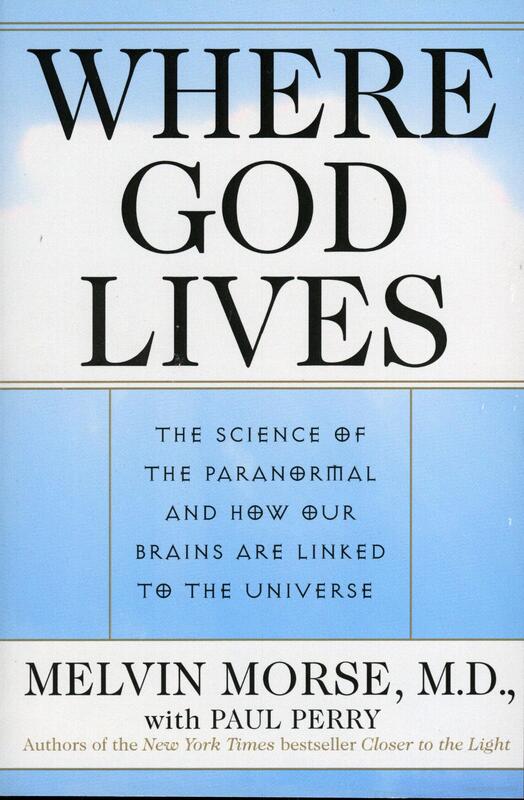
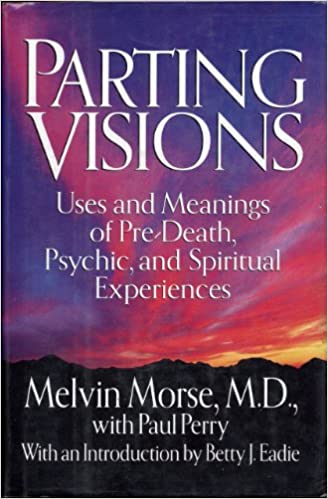
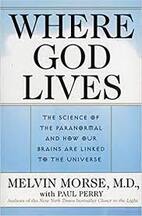
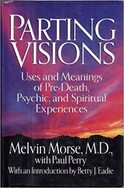
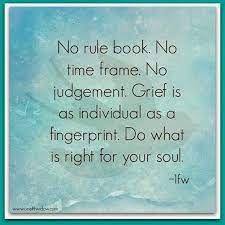
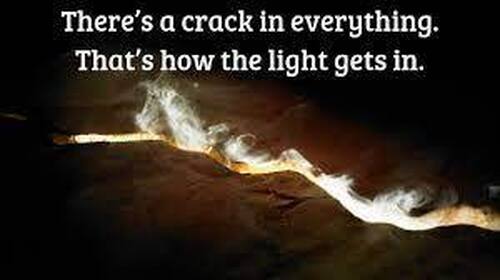
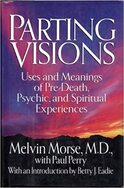
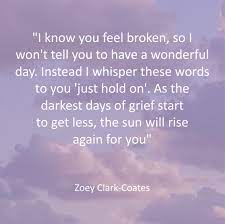

 RSS Feed
RSS Feed
